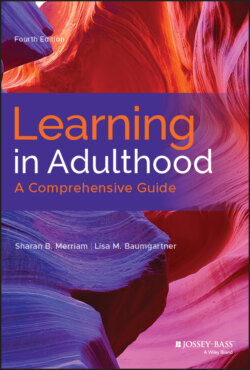Читать книгу Learning in Adulthood - Sharan B. Merriam - Страница 2
Table of Contents
Оглавление1 Cover
2 Acknowledgments
3 Preface Overview of the Contents
4 About the Authors
5 Part I: Adult Learning in Contemporary Society Chapter 1: The Social Context of Adult Learning Changing Demographics Globalization Technology The Convergence of Demographics, Globalization, and Technology Summary Chapter 2: Adult Learning and Technology History of Distance Education: From Mail to MOOCs Learning Theories for Online Education Blended Learning Best Practices for Online Teaching Challenges in the Online Learning Environment Informal and Nonformal Learning and Technology The Future of Technology in Adult and Higher Education Summary Chapter 3: Learning Environments and Learning Concepts Where Learning Occurs Organizational Learning and the Learning Organization Lifelong Learning and the Learning Society Summary Chapter 4: Adult Learners: Who Participates and Why Who Participates? Why Adults Do or Do Not Participate Problematizing the Concept of Participation Summary
6 Part II: Adult Learning Theory Chapter 5: Knowles's Andragogy and McClusky's Theory of Margin Andragogy McClusky's Theory of Margin Summary Chapter 6: Self-Directed Learning Recent Applications Goals of Self-Directed Learning Self-Directed Learning as a Process Self-Direction as a Personal Attribute of Learners Applications of SDL and Building Research and Theory Summary Chapter 7: Transformative Learning Transformative Learning: Many Lenses Mezirow's Psychocritical Approach Key Concepts in Transformational Learning Tensions and Issues in Transformational Learning Theory Summary Chapter 8: Experience and Learning Learning from Life Experiences Models of Experiential Learning Educators' Roles and Purposes Instructional Methods Centering on Experience and Reflection Summary
7 Part III: Newer Approaches to Adult Learning Chapter 9: Embodied, Spiritual, and Narrative Learning Embodied Learning Spirituality and Learning Narrative Learning Summary Chapter 10: Learning and Knowing: Eastern and Indigenous Perspectives Why Study Other Ways of Learning and Knowing? The Western/Non-Western Dichotomy, Culture, and Indigenous Knowledge An Introduction to Five Eastern or Indigenous Perspectives on Learning Common Themes Across Eastern and Indigenous Perspectives Summary Chapter 11: Critical Theory, Postmodern, and Feminist Perspectives Common Themes Critical Theory and Adult Learning Critical Theory in Action Postmodernism and Adult Learning Feminist Pedagogy and Adult Learning Summary
8 Part IV: Learning and Development Chapter 12: Adult Development Four Approaches to Adult Development Biological Development Psychological Development Sociocultural Factors Integrative Perspectives Summary Chapter 13: Cognitive Development in Adulthood Foundational Work on Cognitive Development Linear and Categorical Models of Adult Cognitive Development Dialectical Thinking Wisdom: The Hallmark of Adult Thinking Summary Chapter 14: Intelligence and Aging Approaches to Intelligence Age and Intellectual Abilities Social Conceptualizations of Intelligence Intelligence, Aging, and Adult Learning Summary Chapter 15: Brain, Memory, and Cognition Neurobiology and the Brain Memory Memory and Aging Information Processing Prior Knowledge and Experience Cognitive Style and Learning Style Summary Chapter 16: Reflections on Learning in Adulthood The Learner The Context The Learning Process The Configuration of Learner, Context, and Process Some Concluding Thoughts
9 References
10 Name Index
11 Subject Index
12 End User License Agreement
